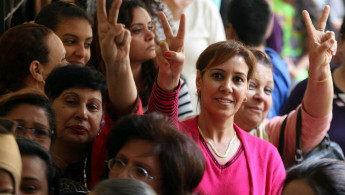Putting a price tag on Egyptian women
Foreign men intending to marry younger Egyptian women must pay 50,000 Egyptian Pounds ($6,385) if the age difference between them exceeds 25 years, according to a new decree issued by Egypt's justice minister Ahmed al-Zend.
The decree, issued on Tuesday, obliges foreign men to deposit the amount in investment certificates in the prospective wives' bank accounts, with a 12.75 percent interest rate to be paid every six months for 10 years.
According to justice ministry spokesperson Hamdi Moawad, the law had already been in effect for 30 years, but the amount required was 40,000 Egyptian Pounds ($5,112), which Zend only increased.
Moawad claimed that the newly amended law "protects girls from injustice".
"We are facing a phenomenon that we cannot eliminate," he told al-Assema TV channel on Tuesday night, "but we can reduce it."
| The girls' families marry them off several times to generate income, and the decree has come to stop this from happening - Mervat Tallawy |
Women's rights advocate Azza Kamel also defended the law, saying that she believed the purpose was to protect the rights of Egyptian women, along with addressing the issue of child marriage.
"While I believe that this law will provide insurance [for Egyptian women], I still believe this is not enough to eliminate child marriage. There have to be some kind of guarantees," she told Ahram Online.
However, Kamel added that the age restriction imposed in the law was a problem, as it covers "specific cases only", which does not provide the assurance needed.
Mervat Tallawy, head of the National Council for Women, said that the new amendment came to preserve the rights of Egyptian women and prevent child marriage.
"However, the law should also prevent the withdrawal of the money for at least five years to stop the bride's family from circumventing the law," she told ON TV on Tuesday.
"The girls' families marry them off several times to generate income," she added, "and the decree has come to stop this from happening."
Ahmed Karima, Professor of Islamic Sharia law at al-Azhar University, told the Sada al-Balad TV channel that the law complied with the principles of Islam, as it legalises social interests and preserves women's rights.
"The decree aims to protect women from becoming homeless," he said.
Karima also suggested the involvement of the embassy of the suitor's country in the case of disputes.
| Read also: Who's the daddy? Ezz, Zeina and Egypt's Urfi marriages |
A 'humiliating' price tag
But Zend's decree has sparked outrage in Egypt, with many rights organisations and public figures describing it as a humiliating decision that puts a price tag on Egyptian women.
Shahendah Maklad, a member of Egypt's National Council for Human Rights, told Egyptian TV channel Dream II that the decree revived the slave trade in Egypt, comparing it eith decisions made by the Islamic State group.
"This is a painful and humiliating decision," she said.
"Civil society organisations should reach out to the people who are forced to sell their daughters because of poverty, instead of helping them keep it up."
The Centre for Egyptian Women Legal Assistance (CEWLA) issued a statement on Tuesday condemning the decree and affirming that Egyptian women were "not for sale".
| Individuals from the Gulf purchase Egyptian women and girls for 'temporary' or 'summer' marriages for the purpose of prostitution or forced labor - Trafficking in Persons report |
"[The decree] will not solve the problem of trafficking," the statement read. "It will open the door to those who want to exceed this limit and marry more than one wife."
The statement also called for changing the decree through working mechanisms and "taking the necessary legal and legislative measures to protect women and girls from its repercussions".
Nehad Abul Komsan, chair of the Egyptian Center for Women's Rights, said that investment certificates would not solve the problems resulting from marriages between foreign men and young Egyptian women.
"The decree destroys the efforts exerted by rights organisations to eliminate this phenomenon, which usually causes various problems," she said.
"Women - and their children - find themselves homeless after being divorced by the foreign men," she explained. "They also face murder and domestic violence."
"Most of these girls are minors who usually come from poverty-stricken rural areas."
Forced marriage is a widespread phenomenon in poverty-stricken areas across Egypt, with some families forcing their young daughters to "marry" older suitors from several countries, mainly the Gulf, according to the US State Department's 2015 Trafficking in Persons report.
"Individuals from the Gulf, including Saudi Arabia, the United Arab Emirates, and Kuwait, purchase Egyptian women and girls for 'temporary' or 'summer' marriages for the purpose of prostitution or forced labor," the US report said.
"These arrangements are often facilitated by the victims' parents and marriage brokers, who profit from the transaction."
According to Egypt's National Council for Childhood and Motherhood, the suitors usually desert their young brides shortly after the marriage, depriving them of their rights.



